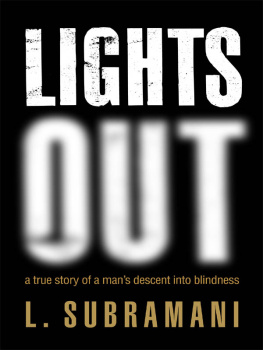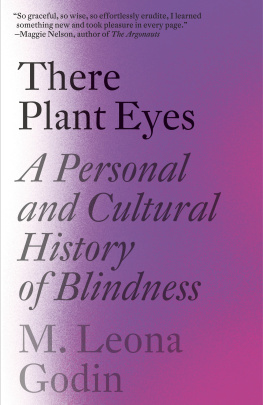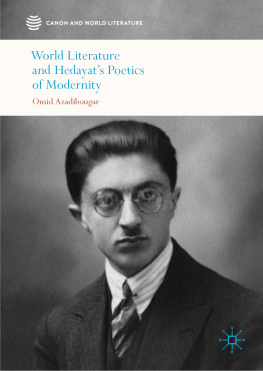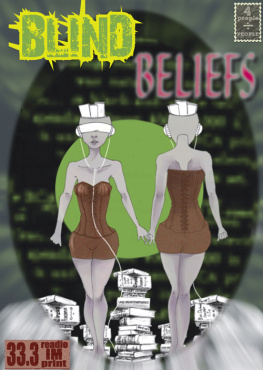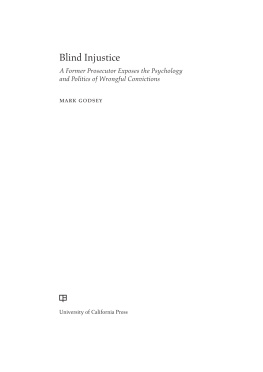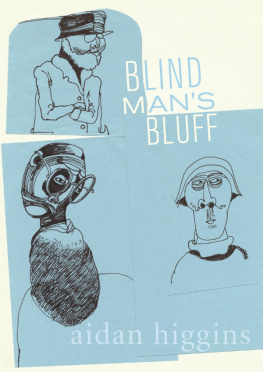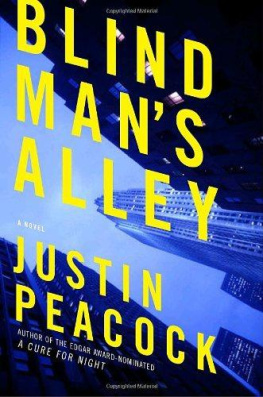Sadegh Hedayat - The blind owl
Here you can read online Sadegh Hedayat - The blind owl full text of the book (entire story) in english for free. Download pdf and epub, get meaning, cover and reviews about this ebook. year: 1989, publisher: Grove Press, genre: Science. Description of the work, (preface) as well as reviews are available. Best literature library LitArk.com created for fans of good reading and offers a wide selection of genres:
Romance novel
Science fiction
Adventure
Detective
Science
History
Home and family
Prose
Art
Politics
Computer
Non-fiction
Religion
Business
Children
Humor
Choose a favorite category and find really read worthwhile books. Enjoy immersion in the world of imagination, feel the emotions of the characters or learn something new for yourself, make an fascinating discovery.

- Book:The blind owl
- Author:
- Publisher:Grove Press
- Genre:
- Year:1989
- Rating:3 / 5
- Favourites:Add to favourites
- Your mark:
- 60
- 1
- 2
- 3
- 4
- 5
The blind owl: summary, description and annotation
We offer to read an annotation, description, summary or preface (depends on what the author of the book "The blind owl" wrote himself). If you haven't found the necessary information about the book — write in the comments, we will try to find it.
The blind owl — read online for free the complete book (whole text) full work
Below is the text of the book, divided by pages. System saving the place of the last page read, allows you to conveniently read the book "The blind owl" online for free, without having to search again every time where you left off. Put a bookmark, and you can go to the page where you finished reading at any time.
Font size:
Interval:
Bookmark:
THE BLIND OWL
SADEGH HEDAYAT
TRANSLATED BY D. P. COSTELLO
In this mean world of wretchedness and misery I thought that for once a ray of sunlight had broken upon my life. Alas, it was not sunlight, but a passing gleam, a falling star, which flashed upon me, in the form of a womanor of an angel. In its light, in the course of a second, of a single moment, I beheld all the wretchedness of my existence and apprehended the glory and splendour of the star. After, that brightness disappeared again in the whirlpool of darkness in which it was bound inevitably to disappear. I was unable to retain that passing gleam.
It is three monthsno, it is two months and four days since I lost her from sight but the memory of those magic eyes, of the fatal radiance of those eyes, has remained with me at all times. How can I forget her, who is so intimately bound up with my own existence ?
No, I shall never utter her name. For now, with her slender, ethereal, misty form, her great, shining, wondering eyes, in the depths of which my life has slowly and painfully burned and melted away, she no longer belongs to this mean, cruel world. No, I must not defile her name by contact with earthly things.
After she had gone I withdrew from the company of man, from the company of the stupid and the successful and, in order to forget, took refuge in wine and opium. My life passed, and still passes, within the four walls of my room. All my life has passed within four walls.
I used to work through the day, decorating the covers of pen-cases. Or, rather, I spent on my trade of pen-case decorator the time that I did not devote to wine and opium. I had chosen this ludicrous trade of pen-case decorator only in order to stupefy myself, in order somehow or other to kill time.
I am fortunate in that the house where I live is situated beyond the edge of the city in a quiet district far from the noise and bustle of life. It is completely isolated and around it lie ruins. Only on the far side of the gully one can see a number of squat mud-brick houses which mark the extreme limit of the city. They must have been built by some fool or madman heaven knows how long ago. When I shut my eyes not only can I see every detail of their structure but I seem to feel the weight of them pressing on my shoulders. They are the sort of houses which one finds depicted only on the covers of ancient pen-cases.
I am obliged to set all this down on paper in order to disentangle the various threads of my story. I am obliged to explain it all for the benefit of my shadow on the wall.
Yes, in the past only one consolation, and that a poor one, remained to me. Within the four walls of my room I painted my pictures on the pen-cases and thereby, thanks to this ludicrous occupation of mine, managed to get through the day. But when once I had seen those two eyes, once I had seen her, activity of any sort lost all meaning, all content, all value for me.
I would mention a strange, an incredible thing. For some reason unknown to me the subject of all my painting was from the very beginning one and the same. It consisted always of a cypress tree at the foot of which was squatting a bent old man like an Indian fakir. He had a long cloak wrapped about him and wore a turban on his head. The index finger of his left hand was pressed to his lips in a gesture of surprise. Before him stood a girl in a long black dress, leaning towards him and offering him a flower of morning glory. Between them ran a little stream. Had I seen the subject of this picture at some time in the past or had it been revealed to me in a dream ? I do not know. What I do know is that whenever I sat down to paint I reproduced the same design, the same subject. My hand independently of my will always depicted the same scene. Strangest of all, I found customers for these paintings of mine. I even despatched some of my pen-case covers to India through the intermediary of my paternal uncle, who used to sell them and remit the money to me.
Somehow I always felt this subject to be remote and, at the same time, curiously familiar to me. I dont remember very well.... It occurs to me that I once said to myself that I must write down what I remember of all thisbut that happened much later and has nothing to do with the subject of my painting. Moreover, one consequence of this experience was that I gave up painting altogether. That was two months, or, rather exactly, two months and four days ago.
It was the thirteenth day of Nouruz. [The national festival of Iran. It begins on 21 March and lasts for thirteen days. It is the custom to spend the last day of Nouruz picnicking in the country.] Everyone had gone out to the country. I had shut the window of my room in order to be able to concentrate on my painting. It was not long before sunset and I was working away when suddenly the door opened and my uncle came into the room. That is, he said he was my uncle. I had never seen my uncle in my life, for he had been abroad ever since his early youth. I seem to remember that he was a sea-captain. I imagined he might have some business matter to discuss with me, since I understood that he was interested in commerce as well. At all events my uncle was a bent old man with an Indian turban on his head and a ragged yellow cloak on his back; his face was partly concealed by a scarf wrapped around his neck; his shirt was open and revealed a hairy chest. It would have been possible to count the hairs of the sparse beard protruding from under the scarf which muffled his neck. His eyelids were red and sore and he had a hare-lip. He resembled me in a remote, comical way like a reflection in a distorting mirror. I had always pictured my father something like this. On entering the room he walked straight across to the opposite wall and squatted on the floor. It occurred to me that I ought to offer him some refreshment in honour of his arrival. I lit the lamp and went into the little dark closet which opens off my room. I searched every corner in the hope of finding something suitable to offer him, although I knew there was nothing of the sort in the houseI had no opium or drink left. Suddenly my eye lighted on the topmost of the shelves on the wall. It was as though I had had a flash of inspiration. On the shelf stood a bottle of old wine which had been left me by my parents. I seem to remember hearing that it had been laid down on the occasion of my birth. There it was on the top shelf. I had never so much as given it a thought and had quite forgotten there was such a thing in the house. To reach the shelf I got up onto a stool which happened to be there. As I reached towards the bottle, I chanced to look out through the ventilation-hole above the shelf. On the open ground outside my room I saw a bent old man sitting at the foot of a cypress tree with a young girlno, an angel from heavenstanding before him. She was leaning forward and with her right hand was offering him a blue flower of morning glory. The old man was biting the nail of the index finger of his left hand.
The girl was directly opposite me but she appeared to be quite unaware of her surroundings. She was gazing straight ahead without looking at anything in particular. She wore on her lips a vague, involuntary smile as though she was thinking of someone who was absent. It was then that I first beheld those frightening, magic eyes, those eyes which seemed to express a bitter reproach to mankind, with their look of anxiety and wonder, of menace and promiseand the current of my existence was drawn towards those shining eyes charged with manifold significance and sank into their depths. That magnetic mirror drew my entire being towards it with inconceivable force. They were slanting, Turkoman eyes of supernatural, intoxicating radiance which at once frightened and attracted, as though they had looked upon terrible, transcendental things which it was given to no one but her to see. Her cheekbones were prominent and her forehead high. Her eyebrows were slender and met in the middle. Her lips were full and halfopen as though they had broken away only a moment before from a long, passionate kiss and were not yet sated. Her face, pale as the moon, was framed in the mass of her black, dishevelled hair and one strand clung to her temple. The fineness of her limbs and the ethereal unconstraint of her movements marked her as one who was not fated to live long in this world. No one but a Hindu temple dancer could have possessed her harmonious grace of movement.
Next pageFont size:
Interval:
Bookmark:
Similar books «The blind owl»
Look at similar books to The blind owl. We have selected literature similar in name and meaning in the hope of providing readers with more options to find new, interesting, not yet read works.
Discussion, reviews of the book The blind owl and just readers' own opinions. Leave your comments, write what you think about the work, its meaning or the main characters. Specify what exactly you liked and what you didn't like, and why you think so.

